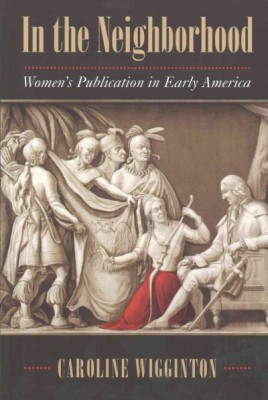| In the Neighborhood: Women's Publication in Early America Contributor(s): Wigginton, Caroline (Author) |
|
 |
ISBN: 1625342225 ISBN-13: 9781625342225 Publisher: University of Massachusetts Press OUR PRICE: $26.55 Product Type: Paperback - Other Formats Published: April 2016 |
| Additional Information |
| BISAC Categories: - Literary Criticism | American - General - Social Science | Women's Studies |
| Dewey: 810.992 |
| LCCN: 2016004212 |
| Physical Information: 0.7" H x 6" W x 8.9" (0.80 lbs) 240 pages |
| Themes: - Sex & Gender - Feminine |
| Descriptions, Reviews, Etc. |
| Publisher Description: In this compelling and original book, Caroline Wigginton reshapes our understanding of early American literary history. Overturning long-standing connections between the male-dominated print culture of pamphlets, broadsides, and newspapers and the transformative ideas that instigated the American Revolution, Wigginton explores how women's relational publications--circulated texts, objects, and performances--transformed their public and intimate worlds. She argues that Native, black, and white women's interpersonal publications revolutionized the dynamics of power and connection in public and private spaces, whether those spaces were Quaker meeting houses, Creek talwas, trading posts, burial grounds, or the women's own neighborhoods. Informed by deep and rich archival research, Wigginton's case studies explore specific instances of relational publication. The book begins with a pairing of examples--the statement a grieving Lenape mother made through a wampum belt and the political affiliations created when a salon hostess shared her poetry. Subsequent chapters trace a history of women's publication practice, including a Creek woman's diplomatic and legal procession-spectacles in the colonial Southeast, a black mother's expression of protest in Newport, Rhode Island, and the resulting evangelical revival, Phillis Wheatley's elegies that refigured neighborhoods of enslaved and free Bostonians, and a Quaker woman's pious and political commonplace book in Revolutionary Philadelphia. |